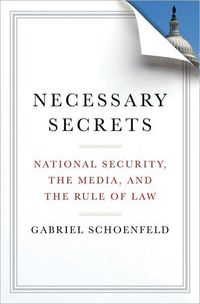

Purchase
W W Norton
August 2010
On Sale: August 16, 2010
320 pages
ISBN: 0393076482
EAN: 9780393076486
Hardcover
Add to Wish List
Non-Fiction
An intensely controversial scrutiny of American democracy's
fundamental tension between the competing imperatives of
security and openness. "Leaking"--the unauthorized
disclosure of classified information--is a well-established
part of the U.S. government's normal functioning. Gabriel
Schoenfeld examines history and legal precedent to argue
that leaks of highly sensitive national-security secrets
have reached hitherto unthinkable extremes, with dangerous
potential for post-9/11 America. He starts with the New York
Times's recent decision to reveal the existence of National
Security Agency programs created under the Bush
administration. He then steps back to the Founding Fathers'
intense preoccupation with secrecy. In his survey of U.S.
history, Schoenfeld discovers a growing rift between a press
that sees itself as the heroic force promoting the public's
"right to know" and a government that needs to safeguard
information vital to the effective conduct of foreign
policy. A masterful contribution to our understanding of the
First Amendment, Necessary Secrets marshals the historical
evidence that leaks of highly classified government
information not only endanger the public but, in some
extraordinary circumstances, merit legal prosecution of
those who publish them.
Comments
No comments posted.
Registered users may leave comments.
Log in or register now!
| 


 © 2003-2025 off-the-edge.net
all rights reserved Privacy Policy
© 2003-2025 off-the-edge.net
all rights reserved Privacy Policy